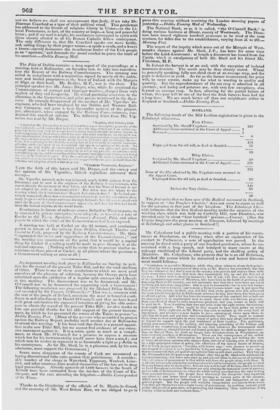"London, lEttli October 1836. " I find that Mr. Ni111110
has flu nisited you with n report deseriptit e generally of the III'Sselected; and I coUrest that ii, look iti .! over the ma lo of Irebt WI, I int rather stir- pHs.' I we have demi able to ConlrAell,1 So many important and exteusive objeets in tech cainpatatit ely short lines; awl I um more. and more comineml, ou the most ma- ture consideratiou, that no other lines could at all tie prof :omit that so completely Meet MC %IV. Gota•rttemitt ns to mail. Battik lines hi I 'eland ; and on sien ing the 14.•0•
It ii'., it in 4rathyiug tio! that the emietrv had styli extremely litsourahle gradieuts,
affording such a pr,..Teet or an e.samittical mil speedy completion el the a wk. No tunnels, no very heavy or arcannilated earth-work. in iinY Idaco. ttol InoroAnt.t through lauds of out Ilghu value. utouhtuic moMing. ;my imerferetwe with resident ial prqw.t , atta tertumatiuz at Go ee Separate and imp,-, tan t tow le:, each beim; the key ot the ,:e.ti:ds lu ond, att thew:vita:Mtge', th, railoay system is to ho intt,Ineed Sm us I tt en I ill ILO fdrer eppurt 'deity cat ju o,eid itself than the selection awl adoption of such a line as yc
The Pilot of Dublin contains a long report of the proceedings at a meeting, held at Ballinasloe, on Saturday last, to take into considera- tion the Report of the Railway Commissioners. Tile meeting was called in compliance with a requisition signed by nearly all the noble- men and landed proprietors in the West of Ireland, with the Marquis of Sligo at their head. Mr. Bodkin, M. P., was in the chair. The principal speaker was Mr. James Dwyer, who, while he acquitted the Commissioners of corrupt and improper motives, charged them with neglect of duty and incapacity. Ile culled particular attention to the alteration in the Commission, and other points mentioned in the Spec- satyr. He strongly disapproved of the conduct of Mr. Vignolles the engineer, who had been employed by the Dublin anti Western Rail. way Company, and gave a very favourable opinion of the project, yet, afterwards, %ellen engaged by the Railway Commissioners, con. Manned this excellent scheme. The following letter from Mr. Nig- mines %vas read by Mr. Dwyer.
"CHARLES viosiostss, Engineer."
Upon the faith of this letter, said Mr. Dwyer, and the sum/ and the opinion of Mr. N'ignolles, Brit:.sh capitalists advanced their
money- Vignolles received, as he was informed, nearly 3,000 guineas from the Directors; and be now is the engineer of the Railway Commissioners, who report direetlt the contrary of that letter, and that the West of Ireland is not vt adapted for raih.fy communieation ! But what was the injury to the ceentry which the Commissioners' Report bad already flow ? As he had pre- viously remarked, there was a vast capital subset bud, arid the sub-erihets were ready to go oil with various railways through lrelauti ; het 111 w as to stand still until the Ireport of the Commissioners appeak.d ; and hvt... far that had toted the desired objects, all the world knew.
Resolutions in favour of railways across Ireland to Western parts, to he executed by private enterprise, were adoieed ; an WaS ills° It vote of thanks to the Tic.rs, Spectator, Freeman's Juurnal, Pita, and other papers in which the errors of the Commissioners bad liLt n exposed.
A meeting was held at Cashel on the 2.1 instant, and resolutions passed in favour of the railway from Dublin, through Thurles and Ceatl to Cork, proposed by the Milted), Commissioners. Alt. Quin " expounded the views and suggestions of the Commissioners ; " and the meeting ices unanimous On the point that it would be a capital thieg for Cashel if a tailway could be made to pass through it at the maimed expense. [Nothing will he easier than to proeure similar re. solutions to those passed at Cashel, in all places where the question is a Government railway or none at all.]


























 Previous page
Previous page